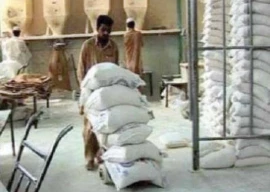
LAHORE:
‘Be the change you want to bring’ was the message given by panellists at a seminar held on Monday at Kinnaird College for Women.
Titled "Pakistan: A Land in Search of a Nation", the seminar was organised by the KC League of Political Activists to discuss involvement of youth in shaping the future of the country. Most of the speakers stressed on the importance of voting and urged the students to cast their vote in all future elections.
Lozina Shoaib, a PhD candidate at the National University of Science and Technology talked about individual contributions to society. Shoaib, born with multiple disabilities has undergone 20 major surgeries. She is now an assistant director at the Ministry of Social Welfare and Special Education. She talked about persistence, motivation and initiative at personal level to add up to a bigger change. “You don’t need to do something very big. You can start off by a smile on your face,” she said.
She said the youth needed to be properly guided to bring a revolution. “We cannot expect a confused youth to bring about a revolution.” She said the youth also needed to be told about the sacrifices made by their ancestors, and that they do not take what they have for granted.
She warned that a “whatever culture” was taking hold of the youth. This, she said, was a serious threat to the identity of Pakistani nation. She said in some ways Pakistanis were not even a nation, but were a crowd. “We cannot be a nation until we cross the line from I to we.”
She stressed the need for a public drive to urge the government to create disability-friendly public places, voting centres during elections and offices and educational institutions.
Shoaib also said the inability to differentiate between right and wrong was a bigger disability than any physical handicap.
Earlier, a presentation by actor Omair Rana, who talked about social apathy and its causes, got large attention from a captivated audience. He started off by asking a jam-packed Hladia Hall, about 500 students, how many of them could name five members of the federal cabinet, the national or provincial assembly. Seeing only a few hands were raised, he said, “When I come back to Kinnaird College after the general elections, I hope to see everybody raising a hand.”
He blamed students’ lack of interest in politics during the past decade for a political vacuum that he said was “a major hurdle” to the country’s development.
Aided with a presentation in the background, Rana said ignorance, fear, laziness, and lack of empathy led to apathy. He also talked about ‘learned helplessness’ caused by the fear of the unknown.
He said he had seen many teachers snubbing students over queries and called it torture. “You must permit queries. If your ideas do not concur, you can agree to disagree,” he said.
Rana said he believed that none of the two people disagreeing over the same idea was ever entirely wrong. It was just the difference in their points of view. He concluded with a movie clip on famous Pakistanis, who broke stereotypes. The hall echoed with guesses as the power point slides with teasers about pioneering personalities were shown.
Sheikh Jaleel, the Punjab joint chief election commissioner in the Election Commission of Pakistan, talked about the ECP’s work of registering the citizens as voters. He told the students about electronic voting machines used in India, Nepal and Sri Lanka, but said that the system might not work in Pakistan due to the high illiteracy rates.
Former KC head girl, Hafsa Shorish, talked about turning dreams and ambitions into reality.
Ibtesam Shahad, president of the Political Science Club, said the objective of the seminar was to enlighten the students about their right to vote, and civic and political activism to make them vigilant citizens.
Zoya Ashraf Chaudhry, the head of the League of Political Activists, said it was time for students to speak up for their rights and their future. “If we don’t speak up for ourselves, no one will.”
Published in The Express Tribune, January 31st, 2012.
















































COMMENTS
Comments are moderated and generally will be posted if they are on-topic and not abusive.
For more information, please see our Comments FAQ